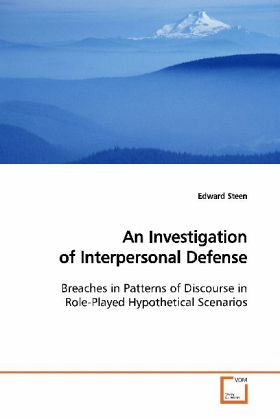
An Investigation of Interpersonal Defense
Breaches in Patterns of Discourse in Role-Played Hypothetical Scenarios
Versandkostenfrei!
Versandfertig in 6-10 Tagen
52,99 €
inkl. MwSt.

PAYBACK Punkte
26 °P sammeln!
A review of the literature reveals a marked neglectof interpersonal and functionalist considerations related to defensiveprocesses. The theory of interpersonal defense addresses this neglect byproviding a model that focuses on patterns of defensive interpersonalbehavior and the functional role they play in interactions, althoughit includes inner processes as well. The present study examines theidea that conflict promotes defense. Surprisingly, there has beenlittle empirical work done on the relation between conflict and defense. We constructed a novel semi-structured role-playing paradigm invo...
A review of the literature reveals a marked neglect
of interpersonal and
functionalist considerations related to defensive
processes. The theory
of interpersonal defense addresses this neglect by
providing a model
that focuses on patterns of defensive interpersonal
behavior and the
functional role they play in interactions, although
it includes inner
processes as well. The present study examines the
idea that conflict
promotes defense. Surprisingly, there has been
little empirical work
done on the relation between conflict and defense.
We constructed a
novel semi-structured role-playing paradigm involving
hypothetical
scenarios to examine the interpersonal processes of
interest. The
findings support the ideas that conflict promotes
defensive
interpersonal behavior and that defensive behavior
can be
characterized as breaches in patterns of discourse,
which should be
viewed as motivated, problematic behavior patterns
that represent
defensive attempts to negotiate conflicts.
of interpersonal and
functionalist considerations related to defensive
processes. The theory
of interpersonal defense addresses this neglect by
providing a model
that focuses on patterns of defensive interpersonal
behavior and the
functional role they play in interactions, although
it includes inner
processes as well. The present study examines the
idea that conflict
promotes defense. Surprisingly, there has been
little empirical work
done on the relation between conflict and defense.
We constructed a
novel semi-structured role-playing paradigm involving
hypothetical
scenarios to examine the interpersonal processes of
interest. The
findings support the ideas that conflict promotes
defensive
interpersonal behavior and that defensive behavior
can be
characterized as breaches in patterns of discourse,
which should be
viewed as motivated, problematic behavior patterns
that represent
defensive attempts to negotiate conflicts.












